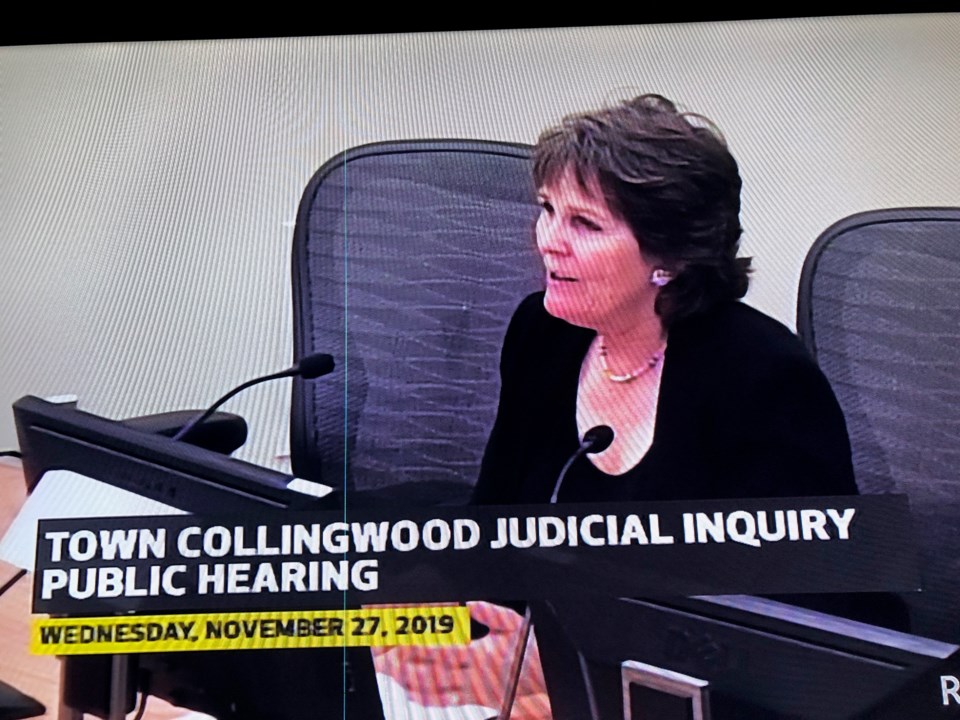The former commissioner of two judicial inquiries was in Collingwood today offering advice and wishing good luck to the Collingwood Judicial Inquiry team.
“It’s difficult for everybody concerned … some people’s jobs are at stake … the community itself can suffer,” said Denise Bellamy, who was an expert witness at the opening of the third phase of inquiry hearings today.
Bellamy was the commissioner for the Toronto Computer Leasing Inquiry and the Toronto External Contracts Inquiry, both of which ran simultaneously. Bellamy released her report on both inquiries and included 244 recommendations related to ethics, governance, lobbying and procurement.
“Public inquiries seem to be part of Canadian culture,” said Bellamy. “We’ve had over 500 of them since confederation … They are often long and expensive and almost always longer and more expensive than the government thinks they’re going to be. They can also be a very painful experience for a lot of people.”
Bellamy turned to Leonard Cohen lyrics to describe the worth and purpose of a public inquiry.
“There’s a crack in everything, that’s how the light gets in,” she quoted. “A public inquiry shines a light through the crack that’s been discovered.”
The Collingwood Judicial Inquiry was called in February 2018, to look into the 2012 share sale (50 per cent) of Collingwood’s public electric utility to PowerStream and investigate the allocations of the share sale funds to build two recreation facilities.
Bellamy shared her experiences as a commissioner with the inquiry today (Nov. 27).
“I finished my report 14 years ago and I still have people ask me, ‘how come nobody went to jail?’” she said. “The public expects it and I think some people feel, why are we spending all this money if nobody is going to jail or is held to account? But people are held to account, just not in the way we can charge them money or send them to jail.”
She said she saw her role as one of finding what went wrong and making recommendations that could stand as principles of integrity and accountability.
Inquiry counsel, Kate McGrann, asked Bellamy how to create a “culture of integrity,” in a municipality.
“Every municipality has a culture,” said Bellamy. “Either formal (written) or informal. Informal is learned from watching what others do. In my view, a government should make sure there is a written code of conduct and that it remains current.”
The Commissioner, Associate Chief Justice Frank Marrocco asked Bellamy how she recommended offering protection to people in municipal government who see something and want to come forward with it.
Bellamy said it is important for all levels of public servants to speak truth to power, though she said she understood that’s a more difficult task for someone lower in the chain of command.
“The more senior you are, the more responsibility you have to speak truth to power,” said Bellamy. “Each person can go to the next level higher up from them. Once they’ve told that person, they’ve done that job … I actually think it’s a fundamental duty of public servants to do that.”
Bellamy’s testimony also dipped into the territories of procurement and lobbying.
She said lobbying as a practice is fine “as long as there are controls on it.”
When it came to questions about lobbying during a procurement process, she delivered a short, decisive response.
“During a government procurement process I don’t think there should be any lobbying of any kind,” said Bellamy. “This is what scandals are made of.”
Bellamy wrapped up her testimony with a practical thought about her work as a commissioner of a public inquiry.
“To me, it’s practical,” she said. “In my case, I felt if people are shopping with my money, they have a responsibility to do it ethically … they have to be accountable to the decision they make.”
Bellamy concluded her testimony around noon today. This afternoon there will be a panel on roles and responsibilities in municipal government featuring panellists John Fleming, Anna Kinastowski, and Greg Levine - all of whom have experience as senior city staff, city solicitors or integrity commissioners.
You can read more about the participants in this third phase of the hearings here.

